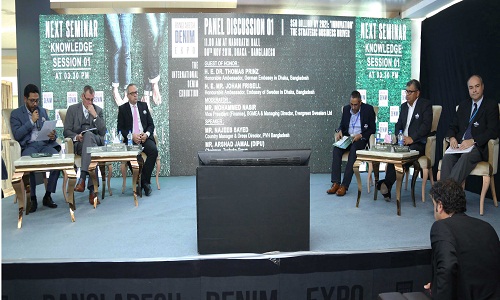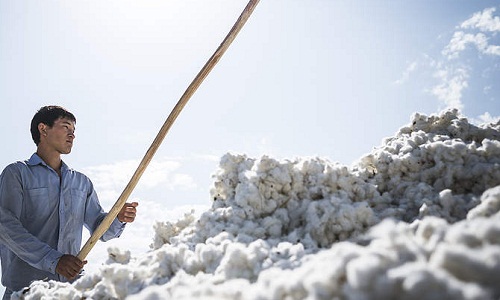FW
Pakistan’s cotton production in 2015-16 declined by 28 per cent. Reasons include: climate change, competition with other crops, lower market prices and the outbreak of pink bollworm. In Pakistan, economic losses from contamination cost the cotton value chain, from raw cotton to garments, $1.4 billion per year.
Pakistan’s future cotton policy envisages a number of strategies which include germ-plasm improvements, development of hybrid cotton, improved farm and crop management, bringing additional area under cultivation, minimising post-harvest losses, increasing cotton production, improving yields per hectare, evolving disease resistant varieties, promoting Bt cotton cultivation and improving the overall quality of cotton.
Cotton in Pakistan is grown by 1.3 million farmers on over 3.1 million hectares of land, which is 15 per cent of the cultivable area of the country, with the average production hovering around 12.7 million bales to 14 million bales. This is consumed largely by the country’s 521 textile mills, although a significant quantity (up to a million bales) is also exported. However, to meet the demand for extra-long staple cotton, about two million bales are imported annually.
The country is also encouraging multinational and national technology providers to introduce the latest and most effective insect protection technology.
China’s October exports fell 7.3 per cent from a year earlier while imports shrank 1.4 per cent. Weak domestic and global demand are adding to doubts that a pick-up in economic activity in the world's largest trading nation can be sustained. China's imports of iron ore, crude oil, coal and copper all fell in October, after its robust demand drove global prices of many major commodities higher this year.
Imports fell for the second month in a row in October after rising for the first time in nearly two years in August. China will face relatively large downward pressure on foreign trade in the fourth quarter, with uncertainties continuing into 2017. Weak exports knocked 7.8 per cent off the country's GDP growth in the first three quarters of this year.
A property boom which generated a significant share of the growth may be peaking, dampening demand for building materials from cement to steel. Steel mills have been cutting output and even starting maintenance work earlier than usual as soaring costs for raw materials such as iron ore and coal squeeze profits.
But although both exports and imports have fallen short of expectations, they have improved on a year-on-year basis. The rate of decline in October moderated from September.
The 5th edition of Bangladesh Denim Expo opened at the city convention center in Dhaka yesterday. The two day exhibition has a total of 54 exhibitors from 15 countries in attendance. Indeed, the number is higher than the previous edition where 49 exhibitors from 13 countries joined in writes Mushfique Wadud.

The 5th edition of Bangladesh Denim Expo opened at the city convention center in Dhaka yesterday. The two day exhibition has a total of 54 exhibitors from 15 countries in attendance. Indeed, the number is higher than the previous edition where 49 exhibitors from 13 countries joined in writes Mushfique Wadud.
Denim takes centrestage
This year, the theme of the exhibition is ‘Natural Denim’. The organizers have given a natural flavor at the exhibition by using locally sourced environmental friendly material bamboo to make stalls at the expo. Handloom machines for salvage denim and hand scrapping are also showcased at the exhibition. Mostafiz Uddin, Founder and CEO of Bangladesh Denim Expo, told Fashionating World that 5,000 registered visitors are attending the exhibition. “Buyers have expressed satisfaction in getting exhibitors of entire denim value chain- from fabrics to washes-under one roof,” Mostafiz explains.

The 55 exhibitors are from across the globe, 12 from Bangladesh, 10 from China, one each from Brazil and Germany, two from India, three from Italy, three from Japan, six from Pakistan, one Singapore, one from Spain, one from Thailand, seven from Turkey and one from Vietnam. Visitors are getting a flavor of all the exhibits under one roof. And as Argiris Simos, Project Manager of BlueConnection, a Singapore-based company says they are happy to take part in the exhibition. “Bangladeshi market is important to us and we are getting a good response here,” he said. Peter from Joinin Textile points out visitors have shown enthusiasm about their products.“This type of exhibition will help us understand Bangladesh market,” he said.
Sharman Hou, Export Manager Assistant of Forshan GLK Textile says they are getting a good response from visitors. “We have got business deals at the exhibition,” says Hou. Similarly, Istanbul-based company Kasive Leather Label, got a good response from visitors.
The first day saw a panel discussion on ‘$50 billion by 2021: Innovation the strategic business driver’. Among others, German ambassador to Bangladesh, Thomas Prinz, Swidish ambassador to Bangladesh, Johan Frisell and BGMEA vice president Mohammad Nasir took part in the discussion. A knowledge session and a technical workshop was also held where Manasij Ganguli, Founder and CEO of ThreadSol gave a presentation on ‘Improving the unit economics of RMG Manufacturing industry’. He said with the help of modern technology, it is possible to reduce fabric wastage. In the technical workshop, Karthik ND, Country MD of Intertek Bangladesh said companies should have a quality management strategy.

The Expo is seeing a number of workshops and seminars with the aim to develop skills of local denim designers, denim developers and denim enthusiasts and to promote the Bangladeshi denim industry. Both workshops and seminars are covering a variety of topics including denim style and trend direction and denim fabric trends. According to Uddin, the purpose of organizing these workshops and seminars is to achieve this objective. He also said that one of the long term objectives of Bangladesh Denim Expo has always been to nurture local talents and help educate them.
Arvind’s consolidated revenue grew 19 per cent for the quarter ended September 30, 2016. Consolidated EBIDTA was up two per cent against the corresponding quarter of the previous year. Profit after tax before exceptional items grew by 20 per cent. Profit after tax after exceptional items was Rs 72 crores.
The group’s textile business recorded nine per cent revenue growth. The brands business grew by 33 per cent. Arvind’s brand portfolio is among the strongest in India and has many power brands that have grown at a phenomenal pace. The turnover was Rs 2,300 crores for 2015-16 and is one of the fastest growing businesses in the country with a CAGR of 25 per cent for the past three years. The portfolio includes global marquee brands such as Calvin Klein, Tommy Hilfiger, US Polo Assn., Ed Hardy, Hanes, Arrow, Gant and Nautica, among others.
The company is confident of continuing the growth momentum and taking the business from over Rs 3,200 crores this year to Rs 9,000 crores by 2022. Meanwhile Arvind will dilute 10 per cent stake in its brand business arm and in doing so raise about Rs 740 crores. The entire stake will be picked up by Multiples, a private equity firm.
"With close to 350 million people working in the cotton industry, more than the entire US population of 318 million people, cotton industry is vast and growing. It directly employs 100 million households in cotton production, having 90 per cent share in developing countries. In 2013, 25.8 million tons of cotton lint were produced. Cotton is grown in more than 100 countries on 2.5 per cent of the world's arable land, making it one of the most significant crops in terms of land use after food grains and soybeans."

With close to 350 million people working in the cotton industry, more than the entire US population of 318 million people, cotton industry is vast and growing. It directly employs 100 million households in cotton production, having 90 per cent share in developing countries. In 2013, 25.8 million tons of cotton lint were produced. Cotton is grown in more than 100 countries on 2.5 per cent of the world's arable land, making it one of the most significant crops in terms of land use after food grains and soybeans.
The advent of cheap, disposable fashion ‘fast fashion’ has led to increasing demand for cotton and greater competition in the market. Real cotton prices, taking inflation into account, have fallen from $3.00/kg in the 1960s to $1.73 in 2014. In the US, the cotton industry is subsidised, so that farmers are able to weather the reduction in prices than growers who only receive market prices.
Environmental impact of cotton

To make that favourite T-shirt, it takes about 2,720 litre of water, which is about the size of a large suburban rainwater tank. Artificial irrigation is used for much of the land, which leads to salinisation and depletion of local water supplies. The drying up of 90 per cent of the Aral Sea in Central Asia is a devastating example of the effect of artificial irrigation for cotton production.
Conventional cotton production also involves the large-scale use of chemical herbicides and pesticides to control weeds and pests. These pollute the environment and impact the land's productive capacity, which makes it harder for people to grow food, and can also cause serious health impacts. It is staggering to learn that half of the $2 billion of chemical pesticides used each year are classified as hazardous by the World Health Organization.
With an intent to enhance yields and incomes, farmers have been shifting to genetically-modified (GM) cotton. For instance, in 2012, close to 81 per cent of cotton planted was GM. However, the use of GM cotton seeds forces farmers into buying expensive seeds and pesticides each year from multinational companies. In India, over 270,000 Indian farmers committed suicide between 1995 and 2014 after becoming victims of banks to fund the increasing costs of pesticides and GM cotton seeds.
Impact on people
There is a human rights aspect to the story as well. Till recently, school children in Uzbekistan were forced to pick cotton to meet government-imposed quotas. After sustained pressure from local and international organisations and foreign governments, Uzbekistan changed its forced labour policies in 2012 to no longer mobilise children younger than 16 on a mass scale. While the reduction in child labour is a positive outcome, it did not represent an end to forced labour in its entirety. But the entire exercise has seen an increase in the number of adults forced to work the cotton harvest to compensate, including teachers, doctors and nurses.
The biggest reason as to why these countries are still employing such practices is because in clothing labels, you will not find details about origin of sourcing materials, it will only have the country where the garment is produced. The Environmental Justice Foundation highlights that cotton has historically proved difficult to trace both because it is traded as an international commodity, and because the supply chain itself is long and complex, typically having 6/7 players from fibre to retail.
Shifting tastes ushers in change
The above facts point towards unsustainable expanse of conventional cotton production, yet they don’t suggest a shift to alternative fabrics, which have their own inherent problems. Polyester is a synthetic material made from petrochemicals and is non-biodegradable. Bamboo fabric is generally made by converting raw bamboo into a rayon or viscose with hazardous chemicals, which endanger the safety of workers and degrade the environment with waste.
Where cotton is produced with a focus on social and environmental sustainability, it remains a good choice as a clothing fabric. Today, many organisations are taking steps to build a more sustainable cotton industry. In the light of this, many farmers have resorted to organic cotton production. Unlike conventional cotton, the organic variety does not involve the use of synthetic pesticides. Natural pesticides are used in some circumstances, but the focus is more on better farming practices including crop rotation, crop diversification, and choosing varieties suited to local conditions.
The Global Organic Textile Standard (GOTS) is a standard for organic certification and includes environmental and social responsibility requirements including a prohibition on certain chemicals, a requirement for safe and hygienic working conditions, the payment of a living wage, and a prohibition on child labour. It covers the entire textile supply chain (processing, manufacturing, packaging, labelling, trading, distribution), and gives consumers reassurance that clothes carrying the GOTS label have been produced in the eco-friendliest and socially responsible manner.
Fairtrade also has a certification scheme for cotton. The focus of Fairtrade cotton is to tackle poverty and empower producers and workers to take control over their lives and the decisions that affect them. It does so by supporting certified farmers with fairer, more stable prices. Additional income is also used to invest in infrastructure, training, farm equipment and business improvements, as well as programmes such as healthcare, clean water and education. Fairtrade certification for cotton also requires minimised use and safe handling and storage of pesticides, herbicides and hazardous chemicals, and a prohibition on forced labour.
Another noteworthy initiative is the World-Wide Fund for Nature's Better Cotton Initiative, a standard for improving sustainability in cotton production in terms of environmental, social and economic responsibility. The Environmental Justice Foundation also helps retailers investigate the supply chain in their cotton products, to help them eliminate human rights or environmental abuses.
Ultimately, the choice lies with us to embrace these positive changes and guide our purchases so that cotton can continue to survive as an industry and as the preferred raw material for fabric manufacturing.
Techtextil Russia will be held from February 20 to 22, 2017. This is the ninth edition. Current issues, challenges and prospects for the industry in general and its most dynamic segments will be discussed as also the production and effective use of various types of technical textiles, the scientific and economic aspects.
Technical textiles and equipment for its production are recognized as the main factors in the development of Russian textile and light industry. This sub-sector has been actively promoted and supported at the regional and federal levels. Market players understand the importance of this industry and increase production capacity, actively engage themselves in transfer of foreign technologies in this field as well as localization of production.
In 2016, 120 companies from 15 countries, including Belarus, Belgium, China, Egypt, France, Germany, India, Italy, Netherlands, Slovenia, Switzerland, Tunisia, and Russia, presented their equipment, technologies and products at Techtextil Russia. Of those, more than 20 companies participated for the first time, reflecting the constantly growing importance and popularity of the fair and its professional recognition. One of these was Aditya Birla. Indian companies’ products and technologies attracted great attention from professional visitors. There were national pavilions of Belgium, China, Italy and Germany.
Sangam India has bagged export orders for denim and polyester viscose fabrics worth Rs 35 crores. The new orders are from Egypt, Saudi Arabia, Latin America and Afghanistan. These orders are to be executed in the next four months. The group is a forerunner in manufacturing ready to stitch fabric with an annual capacity to produce 30 million meters of fabric and 40 million meters of denim.
Sangam, which began operations in 1984, has more than 2, 00,000 spindles and 3,000 rotors for producing polyester viscose dyed yarn, cotton and open end yarn. The contribution of exports in the denim business of Sangam has grown from five per cent to 30 per cent in the last 18 months.
The group is the largest producer of polyester viscose dyed yarn in Asia at a single location. The company's pending order book position stands at Rs 238.22 crores, of which Rs 125.60 crores are exports. The company is targeting an export revenue of Rs 450 crores in the current financial year. The seamless garment manufacturing facility has 36 seamless knitting machines with the capacity to produce 3.6 million pieces per annum. With over 10,000 employees, Sangam has diversified into infrastructure, power and steel.
Raymond has clocked in a turnover of Rs. 2,673 crores during the first half of the current financial year, which is a nine per cent growth over the same period last year. Textile segment sales for the second quarter ended September 30, 2016, grew by 12 per cent to Rs 779 crores. Suiting fabric grew by 10 per cent and B2C shirting fabric grew by 23 per cent during the same period. Apparel segment sales for the quarter increased by 18 per cent to Rs. 383 crores on the back of sustained investments in brands.
Garmenting segment sales increased by 18 per cent to Rs 186 crores during the second quarter. The luxury cotton shirting fabric business grew by 14 per cent to Rs 148 crores during the same period. The group will continue to focus on its core areas of brand building, enhancing customer experience, retaining network expansion and operational efficiency.
Raymond registered a good top line and bottom line growth. It remains confident about the long term demand and the strategic direction of its business. The Raymond Group was incorporated in 1925 and within a few years transformed from being an Indian textile major to being a global conglomerate.
Neither re-shoring nor back-shoring will bring back many jobs that were lost via off-shoring with apparel production being still dominated by globalization, opines International Apparel Federation (IAF) president Han Bekke. He was speaking at the Sewn Products Equipment & Suppliers of the America (SPESA) Executive Conference in San Antonio (Texas-USA) recently where many apparel machinery suppliers had converged. Pressure for cheaper prices still persists in abundance, Bekke added. He pointed at the dominance of big players in the fashion market who have made globalisation more accessible via better IT systems and processes in their supply chain. Most of the apparel production takes place in Asia, Middle and South America and Turkey, he maintained.
Nevertheless Bekke forsees a future for local manufacturing given the innumerous challenges the fashion sector is facing. The race to the bottom in terms of prices will not help companies to improve their profitability on a long term. Consumer behaviour is changing in a climate of disruptive economical activities. Sustainability (social compliance and environmental compliance) is leading to a growing demand if not pressure for transparency, traceability and accountability.
The fashion system has to reinvent itself, Bekke observed. Speed to market and mass customization form a growing business case for manufacturing closer to the market, he added. New technologies like 3D manufacturing and printing, robotisation and digitalisation could create new high-skilled jobs but less than the jobs that were lost via off-shoring.
Bangladeshi entrepreneurs can enrich their technical knowhow on apparel products and attract global buyers through participating in expositions across the world says Michael Scherpe, President and CEO of Messe Frankfurt France. Participation in international exhibitions is very important for manufacturers to attract buyers. Entrepreneurs can exchange views and knowledge that would help them to improve quality of products and establish a network with buyers. And Paris, the center of fashion, is one of the best places for companies to learn how to improve their overall presentation.
Bangladesh is the world’s second largest garment exporter. Messe Frankfurt Paris holds Texworld and Apparel Fair twice a year, which are important events for apparel, fashion and fabric sector exhibitors. Fairs within Bangladesh project the quality of exports to visitors from home and abroad. Local producers in the remote areas of rural Bangladesh who do not have the financial strength to participate in international trade fairs have the opportunity to display their products to buyers from abroad at such fairs. On the other hand, overseas participants have the opportunity to display their products to consumers of Bangladesh, where the domestic market for consumer goods is expanding.
Besides foreign participants have the opportunity to display their state-of-the-art technology to local producers and exporters.












